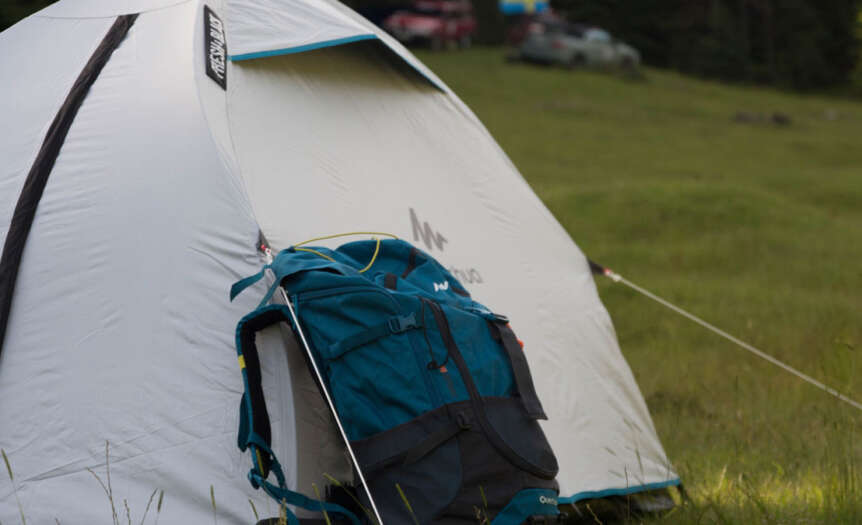As a journalist, no matter where I am or what I am doing, I am always looking at things from the perspective of, “Would this make a good story?” And so I found myself one day in my friend’s RV looking at a bulging camo backpack under her table. At first I thought she had things in there to unpack, but every time I went over, it hadn’t moved. On the last day of her visit, I inquired why the backpack hadn’t moved and why it appears to be as full as on the first day. She looked over and very matter-of-factly said, “It’s my bug-out bag,” and went back to what she was doing. I sat there for a few seconds trying to decipher what on earth she was talking about, and finally, at the risk of looking stupid, I said, “What are you talking about?”
She sat down, pulled out the bag and one by one explained the contents of the bag. A bug-out bag is a backpack that has close to everything a person would need to survive for three days. Now understand, there are different types of bug-out bags. There are ones for the wilderness and ones for urban. She explained that bug-out bags aren’t just for the zombie apocalypse. Anytime she is traveling via RV or car, she throws her bag in the back. If she was somewhere remote and unfamiliar and broke down, she could survive. So, my research on bug-out bags began, and it took me down a very interesting rabbit hole.
I read about the importance of everything from a hiker’s bug-out bag to, yes, the zombie apocalypse one. The one that surprised me the most was the urban one, which is very basic compared to the others but made perfect sense. Think 9/11, when so many people were stranded and hurt in the city and had to walk miles to get home. The urban bug-out bag would have been such a help. It would have things in it like bandages, something to defend yourself with, flashlight, local map, packaged water, pen and paper, money, baseball cap, granola bars and dried fruit. It’s not a backpack because you would start to get strange stares walking into work every day, so it’s more like a courier cross bag. I actually think it’s kind of smart.
With summer around the corner and camping/hiking trips being planned, I thought it would be a good idea to introduce you to the bug-out bag. Now remember, this is a bag that if something happened and you had to be out of your area in literally minutes, you would have everything in this bag where you could just grab it and be out the door. For example, if you are camping and something happens and your car won’t start and you have to evacuate the area and time is a factor, you can just grab this one bag and dash out. That being said, you cannot take things out of this bag to use while camping. You have your camping supplies for that. The last thing you want to happen is to go through your bug-out bag trail mix and then need it while you are walking miles to a town.
List: map of area, compass, water, food, cash in small bills, pen and paper, glasses, sunglasses, knife, waterproof matches, small ax, shovel, flashlight, rain cover, face mask, fire starters, glow sticks, water filtration, solar charger, copies of driver’s license, social security card and passport, family picture and spiritual resource, work gloves, over-the-counter medications and basic first aid supplies, emergency blanket, hygiene items, insect repellant and suntan lotion, whistle, socks, heavy-duty duct tape and eating/drinking utensils.
In researching all this, I came across survivalist schools that I will discuss in next month’s column. Some even have camps for kids, which might make for a very interesting back-to-school story in the fall.













 Deering Estate
Deering Estate
 Massage Envy South Miami
Massage Envy South Miami
 Calla Blow Dry
Calla Blow Dry
 My Derma Clinic
My Derma Clinic
 Sushi Maki
Sushi Maki
 Sports Grill
Sports Grill
 The Healthy Kitchen
The Healthy Kitchen
 Golden Rule Seafood
Golden Rule Seafood
 Malanga Cuban Café
Malanga Cuban Café

 Kathleen Ballard
Kathleen Ballard
 Panter, Panter & Sampedro
Panter, Panter & Sampedro
 Vintage Liquors
Vintage Liquors
 The Dog from Ipanema
The Dog from Ipanema
 Rubinstein Family Chiropractic
Rubinstein Family Chiropractic
 Your Pet’s Best
Your Pet’s Best
 Indigo Republic
Indigo Republic




 ATR Luxury Homes
ATR Luxury Homes


 2112 Design Studio
2112 Design Studio
 Hamilton Fox & Company
Hamilton Fox & Company
 Creative Design Services
Creative Design Services
 Best Pest Professionals
Best Pest Professionals
 HD Tree Services
HD Tree Services
 Trinity Air Conditioning Company
Trinity Air Conditioning Company
 Cisca Construction & Development
Cisca Construction & Development
 Mosquito Joe
Mosquito Joe
 Cutler Bay Solar Solutions
Cutler Bay Solar Solutions


 Miami Royal Ballet & Dance
Miami Royal Ballet & Dance
 Christopher Columbus
Christopher Columbus
 Pineview Preschools
Pineview Preschools
 Westminster
Westminster
 Carrollton
Carrollton
 Lil’ Jungle
Lil’ Jungle
 Frost Science Museum
Frost Science Museum
 Palmer Trinity School
Palmer Trinity School
 South Florida Music
South Florida Music
 Pinecrest Orthodontics
Pinecrest Orthodontics
 Dr. Bob Pediatric Dentist
Dr. Bob Pediatric Dentist
 d.pediatrics
d.pediatrics
 South Miami Women’s Health
South Miami Women’s Health

 The Spot Barbershop
The Spot Barbershop
 My Derma Clinic
My Derma Clinic




 Miami Dance Project
Miami Dance Project

 Rubinstein Family Chiropractic
Rubinstein Family Chiropractic
 Indigo Republic
Indigo Republic

 Safes Universe
Safes Universe
 Vintage Liquors
Vintage Liquors
 Evenings Delight
Evenings Delight





 Atchana’s Homegrown Thai
Atchana’s Homegrown Thai
 Baptist Health South Florida
Baptist Health South Florida

 Laser Eye Center of Miami
Laser Eye Center of Miami
 Visiting Angels
Visiting Angels
 OpusCare of South Florida
OpusCare of South Florida

 Your Pet’s Best
Your Pet’s Best





 HD Tree Services
HD Tree Services
 Hamilton Fox & Company
Hamilton Fox & Company


 Creative Design Services
Creative Design Services